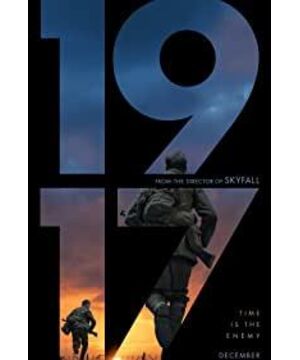I didn't intend to write any film reviews about "1917". It is so subtle that it cannot be said, any language can only be cumbersome and profanity. All I can do is to write the number one god on this personal list over and over again. But last week there was a pretty young lady who asked for a draft, so I will try again.
Before the official review, a concept needs to be introduced, "pure cinema" (pure cinema) . The so-called pure movie is the kind of movie where the content of the story is not important, and the play technique and audio-visual language alone can blow your mind.
In the field of music, there is also a corresponding concept "pure music" (pure music) . Please note that pure music here does not refer to music without human voice singing (instrumental), but refers to music that can be maddening by the arrangement of notes and rhythm alone, regardless of the emotions contained and conveyed by the music. Both songs and music are fine.
For example, the song Coconut (Harry Nilsson) is very close to pure music. Its lyrics are very brainless, which probably means: Don’t mix lime juice and coconut juice together, you will have stomach pain. Just look at the lyrics, you will think: What is this? What the hell? This thing is too embarrassed to say that he is the lyrics? ? ? But with the music, I think, WC, the lyrics count as P, I am hi, the person who wrote the song is a genius!
For another example, many of Mozart's music has a mathematical sense of precision and de-emotional tendency , which makes his work closer to pure music than many composers. I listened to many of Mozart's opera verses, and felt that the content was not important at all. The human voice was just another instrument that served it.
There are such distinctions in all creative fields. For example, some paintings and photographs rely on themes to win (vultures staring at children who are about to die of starvation), while others are better than more intuitive beauty and power (starry night); some literary works are simple in style. , But the theme is profound, some actually don’t say anything, but the literary talent is brilliant (such as "Living on the Tree" in the eyes of Chen Jianxin)...
Of course, no matter which field or form, the standard above everything is: clarity, high quality, can give people excitement and enjoyment . You put together a bunch of unrelated images that no one can understand (such as many so-called avant-garde movies), and then you insist that this is a pure movie, then everyone doesn't recognize it.
If you take the theme as one end point and the technique as the other end, then most movies are in the middle zone. The closer to the end of the theme, the closer to life itself, and the closer to the end of technique, the more difficult it is to create.
Among the movies I have seen, there are two that are closest to pure movies, one is "The Horse of Turin" and the other is "1917" .
So here comes the problem. For example, "Birdman", the same one shot to the end, the same world-class production level, why can't it be regarded as a pure film of high purity? Because of the theme of "Birdman", first of all, it is very time-sensitive (superhero movie), and secondly, the audience is reminded of the theme frequently throughout the film. "Birdman" can be said to be a rather concrete movie, while "The Horse of Turin" and "1917" are much more abstract . This is the subject of two movies & P and the universal history of (timeless and universal), and almost with no clear intent guiding theme of concern (almost never call attention to their themes ). If the movie is personified, "Birdman" seems to keep yelling, "Look at my theme, see my technique", while "The Horse of Turin" and "1917" are much lower-key, "Please don't go there. Just look at my subject and listen to my story." (Don't get me wrong, I also love "Birdman" very much, there is no distinction between high and low.)
The beauty of "1917" is that the story, from the plot to the theme, is too simple. If you want to tell the story plainly and boringly, there are about a million ways. However, the creators have thought of many ways to make it neither mediocre nor boring.
The journey in just one day was divided into:
Our army trenches-battlefields-German trenches-cherry blossom courtyards-country roads-abandoned buildings-small towns-rivers and waterfalls-woods-friendly trenches,
Ten parts ;
In these ten parts, include:
Trenches, plains, potholes, puddles, underground fortifications, farmhouses, roads, bridges, buildings, lanes, houses, rivers, waterfalls, woods...
Wait for at least 14 types of terrain environment ;
In these terrain environments, what happened:
Explosion, rescue, close combat/death, car/cart, one-on-one sniper combat, street fighting, family daily, drifting, singing...
Wait at least nine events ;
These events follow a rhythm of relaxation that seems to be accidental but very regular . Tension must be followed by a moment of relaxation until the next tense event appears. These moments of peace and comfort come from:
Security (no one in the German trenches)
Supply (the farmhouse has milk)
Friendly forces (carry one ride)
Love (a "family of three" with no blood relationship)
Religion (similar to the singing of hymns)
Family (pictures of family).
These seemingly random designs that have been carefully thought and laid out in reality are everywhere in the film, such as cherry blossom petals falling on the river ( echoing ), officers with very different personalities ( differences ), and so on. They have greatly enriched the diversity of story elements and the ups and downs of narrative, just like a chef who carefully mixes condiments, turning the original mediocre ingredients into delicacies. If this is not a craftsmanship , what counts? Is it a so-called blockbuster that relies on feelings to hold up a fragmented and empty narrative?
The most touching moment in the film was the moment when the Devonshire troops appeared in the trenches at the end. You certainly would not have thought that the " end-to-end echo " that an elementary school Chinese teacher talks over and over again when the ears are called out, can be used so profoundly and smartly in the hands of the master. As Diggins’s camera slowly rises, the full picture of this trench reminds you of the trenches that appeared at the beginning of the film. The male protagonist standing on the battlefield has become a completely different person 24 hours later. ——He cursed yesterday, feeling that he was assigned to this task for eight lifetimes; today he rushed forward resolutely, because he knew that if he didn’t do it, no one would do it. And this is a meaningful thing, and it is worth all the effort to do it at the risk of death. Really, every year is similar, every year is different.
This is the only "pointing" in the whole film. The theme is extremely simple and simple. Although it is universal, not everyone agrees. At a certain moment in your life, you will be inexplicably given some responsibilities by the heaven (or superior). These responsibilities are what you don’t want or even hate. However, for various reasons (the important reason in this film is the male protagonist) Feelings for the dead comrade-in-arms Xiaopang), you still do it. After all the hard work, you find that this is an experience that makes life so abundant and abundant, and it is not at all what you thought when you hated it at first. Because of it, you become different and better. The direction of life sometimes depends only on how you answer this question: If not you, then who? If it's not you, then who is it?
Of course, if the responsibility entrusted to you by your superiors is, "You still have to be grateful for 996 every week for the rest of your life, because being able to 996 is your blessing", then you still have to weigh it yourself!
I decided to stop here, because a sturdy movie does not require explanation, and too much language will only compromise its charm. The most precious things in this world are often simple, such as the " initial heart " that is now rotten on the street . Everyone's original intention is different, but what can be called the original intention must be simple. Why are simple things so difficult to obtain and maintain? Because the original intention is simple but expensive, it commands you to forget yourself and devote yourself to a simple, noble, and beyond calculation career . Can you do it?
In a simple and not-so-simple movie like "1917", I saw the original intention of the filmmakers behind the scenes-not for making money, not for flaunting their deep and sharp perspectives, not to capture people's hearts by sensational tears, but, Simply tell a good story , that's it.
The essence of the movie is the story. It is the duty of a filmmaker to tell a good story, and nothing else .
View more about 1917 reviews











